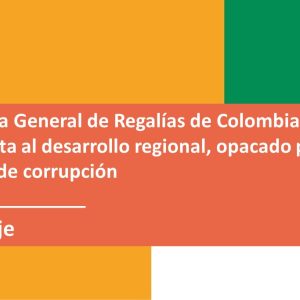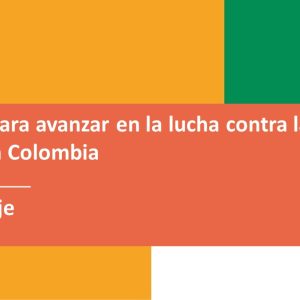In November 2022, the Congress of the Republic approved the budget bill for the General Royalties System (SGR) for the 2023-2024 biennium, for an amount of $31.3 trillion, equivalent to 2.1% of Colombia’s GDP. With that money, it would cover about six times the budget of a department such as Antioquia, which by 2023 is set at 5.4 billion; or ten times that of Valle del Cauca, which is around 3 billion this year.
This $31.1 billion, which enters the country as an economic benefit for the exploitation of non-renewable natural resources, will be distributed as designated in the SGR, and of this amount, $10.1 billion will be allocated to the country’s departments and regions for the approval of high regional impact projects; $3.4 billion will finance projects in science, technology and innovation; $3.4 billion will finance projects to stabilize and transform the territories most affected by violence, poverty, illicit economies and institutional weakness. (see budget distribution).
According to Mapa Inversiones, so far in 2023, 3,827 SGR projects have been approved, with an investment of $5 trillion, of which $284 billion have already been executed, in different sectors such as: agriculture, culture, transportation, science, technology and innovation, among others.
To better monitor these projects, organizations such as Transparencia por Colombia have mapped, promoted and provided different tools to promote higher levels of transparency and access to information in the extractive sector. Among these tools are
INFOBPIN
a technological platform where you can track the identification number of royalty investment projects (BPIN) ( See more tools here).
In addition, the country has been able to make progress in different areas such as social investment or even the construction of tertiary roads, with the use of royalties. Colombia has known initiatives that stand out for the good use and management of these resources, such as the interconnection of ancestral roads by the U’wa community in Boyacá or at the University of Caldas, with a project on biotechnology for waste utilization.
In this regard, the National Planning Department (DNP) and the Universidad del Rosario have an initiative that measures the best projects in the country and the best entities, respectively, within these six categories stand out as: Closing Gaps, Innovation and Orange Economy, Sustainable Income Generation, Environmental Sustainability, Regional Integration and Health Emergency Mitigation. All with a positive impact on the regions.
Another face
Despite the positive impact of the General Royalties System in the regions, corruption has also permeated these monies that belong to Colombians.
For example, the Office of the Comptroller General of the Republic found losses in the resources of the General Royalties System in the Department of Magdalena for $26,520 million due to lack of planning, as well as non-compliance in auditing activities and undelivered works, in an audit carried out in 2021, according to information published on the entity’s web page.
In addition to this, this same entity also found that between 2012 and 2017, about $840,000 million of fiscal incidence in royalty resources were reported, i.e. “works at risk of generating losses for this figure”.
And these scandals have also reached the national media, such as one that came to light in June of last year related to the OCAD Paz. Blu Radio denounced serious irregularities that would have been related to the allocation of these resources and where it is estimated, according to the media, that $500 billion were lost in bribe payments. Among those involved are, paradoxically, officials of the Comptroller’s Office, as well as officials of the DNP and different contractors and congressmen.
Camilo Vallejo, coordinator of the Transparency Observatory of the University of Manizales, assures that the loss of this public money is serious, and even worse, that entities such as the Comptroller’s Office sometimes fall short in their function. He also assures that as long as there is no sanction against the corrupt, there will be no significant progress.
It also warns about how entities that manage these resources do not comply with disclosing quality information or uploading it completely to the different platforms for citizen control. “We have found royalty projects that appeared blank. The government has many strategies, but does not comply with them, they believe that transparency is not relevant,” he comments.
Although, as Camilo mentions, there are information disclosure strategies on investments with royalty resources, for him, these fall short and he assures that beyond the strategies, there must be a commitment of the entities with transparency, and explains that public information must go beyond telling who was assigned the contract, and tell citizens the public information of these projects.
The deficiency in information, the limitations for citizen control of the resources destined to some projects, says Camilo, limits the role of citizens, who, although they are aware of these resources, encounter barriers when they want to access information and consult it in a transparent manner.
The Civil Society Roundtable for Transparency in the Extractive Industries works on the follow-up and strengthening of transparency mechanisms in the General Royalties System – SGR, seeking to ensure that the objectives of transparency, oversight and access to public information are maintained at the highest level, as well as the effective participation of citizens in the approval and follow-up process of projects financed with royalty resources.
For more information write to: secretariatecnica@transparenciacolombia.org.co


